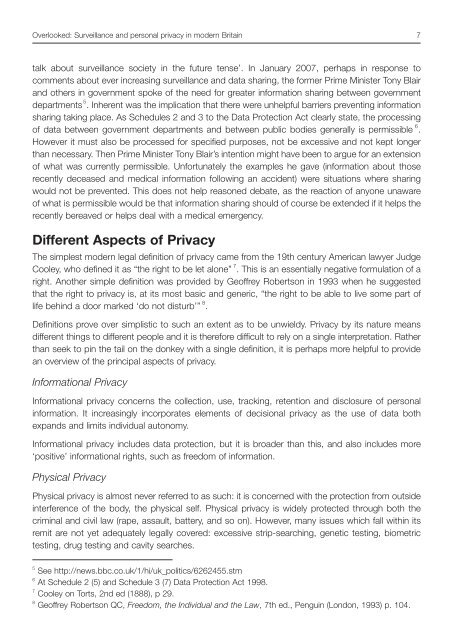Overlooked - Liberty
Overlooked - Liberty
Overlooked - Liberty
You also want an ePaper? Increase the reach of your titles
YUMPU automatically turns print PDFs into web optimized ePapers that Google loves.
<strong>Overlooked</strong>: Surveillance and personal privacy in modern Britain 7<br />
talk about surveillance society in the future tense’. In January 2007, perhaps in response to<br />
comments about ever increasing surveillance and data sharing, the former Prime Minister Tony Blair<br />
and others in government spoke of the need for greater information sharing between government<br />
departments 5 . Inherent was the implication that there were unhelpful barriers preventing information<br />
sharing taking place. As Schedules 2 and 3 to the Data Protection Act clearly state, the processing<br />
of data between government departments and between public bodies generally is permissible 6 .<br />
However it must also be processed for specified purposes, not be excessive and not kept longer<br />
than necessary. Then Prime Minister Tony Blair’s intention might have been to argue for an extension<br />
of what was currently permissible. Unfortunately the examples he gave (information about those<br />
recently deceased and medical information following an accident) were situations where sharing<br />
would not be prevented. This does not help reasoned debate, as the reaction of anyone unaware<br />
of what is permissible would be that information sharing should of course be extended if it helps the<br />
recently bereaved or helps deal with a medical emergency.<br />
Different Aspects of Privacy<br />
The simplest modern legal definition of privacy came from the 19th century American lawyer Judge<br />
Cooley, who defined it as “the right to be let alone” 7 . This is an essentially negative formulation of a<br />
right. Another simple definition was provided by Geoffrey Robertson in 1993 when he suggested<br />
that the right to privacy is, at its most basic and generic, “the right to be able to live some part of<br />
life behind a door marked ‘do not disturb’” 8 .<br />
Definitions prove over simplistic to such an extent as to be unwieldy. Privacy by its nature means<br />
different things to different people and it is therefore difficult to rely on a single interpretation. Rather<br />
than seek to pin the tail on the donkey with a single definition, it is perhaps more helpful to provide<br />
an overview of the principal aspects of privacy.<br />
Informational Privacy<br />
Informational privacy concerns the collection, use, tracking, retention and disclosure of personal<br />
information. It increasingly incorporates elements of decisional privacy as the use of data both<br />
expands and limits individual autonomy.<br />
Informational privacy includes data protection, but it is broader than this, and also includes more<br />
‘positive’ informational rights, such as freedom of information.<br />
Physical Privacy<br />
Physical privacy is almost never referred to as such: it is concerned with the protection from outside<br />
interference of the body, the physical self. Physical privacy is widely protected through both the<br />
criminal and civil law (rape, assault, battery, and so on). However, many issues which fall within its<br />
remit are not yet adequately legally covered: excessive strip-searching, genetic testing, biometric<br />
testing, drug testing and cavity searches.<br />
5<br />
See http://news.bbc.co.uk/1/hi/uk_politics/6262455.stm<br />
6<br />
At Schedule 2 (5) and Schedule 3 (7) Data Protection Act 1998.<br />
7<br />
Cooley on Torts, 2nd ed (1888), p 29.<br />
8<br />
Geoffrey Robertson QC, Freedom, the Individual and the Law, 7th ed., Penguin (London, 1993) p. 104.















